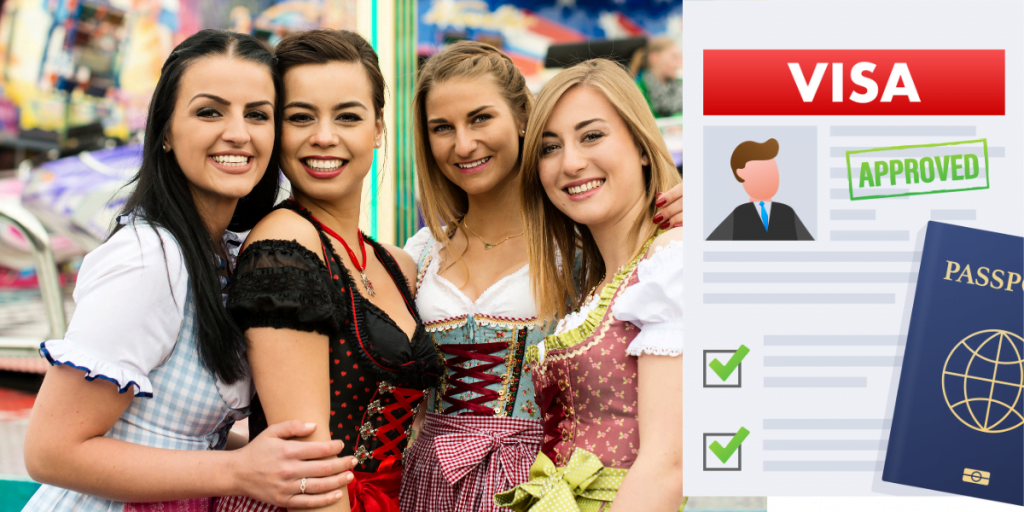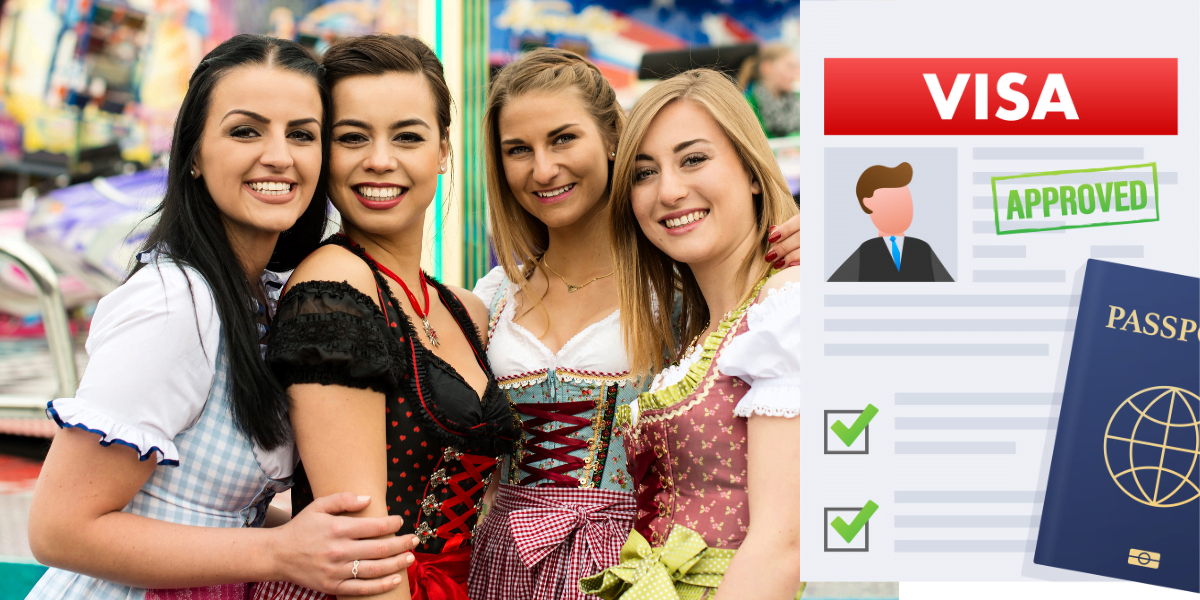Welcome to Germany Visa Guide, your comprehensive resource for all things related to obtaining a visa for Germany. Whether you are planning to visit Germany for business, education, tourism, or to join your family, we are here to guide you through the visa application process.

Our website provides detailed information about the different types of visas available, the required documents, and the application process. We also offer tips and advice on how to prepare for your trip, including information about German culture and customs. We aim to make the visa application process as smooth and stress-free as possible so that you can focus on enjoying your time in Germany.
Who needs a German visa?
Whether you need a visa to enter Germany or not depends on your nationality and the purpose and length of your stay in the country.
Citizens of certain countries, such as the United States, Canada, Australia, New Zealand, Japan, and most European Union countries, do not need a visa for stays up to 90 days within 180 days for tourism, business, or visiting friends and family.
However, if you are a citizen of a non-EU country and you plan to stay in Germany for more than 90 days, or if you plan to work, study, or permanently reside in Germany, you will need to obtain a visa.
Additionally, citizens of some countries, even if they are only visiting for a short time, are required to obtain a visa. It is important to check the visa requirements for your specific situation and nationality before traveling to Germany.
Germany Visa Types
There are different types of visas available for traveling to Germany depending on the purpose and duration of your stay.
- Schengen Visa
- National Visa
- Transit Visa
- Work Visa
- Study Visa
- Family Reunification Visa
- Business Visa
- Researcher Visa
- Employment Visa
- Job Seeker Visa
- Freelancer Visa
- Medical Treatment Visa
Germany Visa for Short-Stay
The German visa for short-stay, also known as the Schengen visa, is a type of visa that allows non-EU citizens to enter Germany for short-term stays of up to 90 days within 180 days. The Schengen visa is also valid for travel to all other Schengen member states, which include most European countries.
The short-stay visa is intended for purposes such as tourism, business, visiting friends and family, attending conferences or cultural events, and medical treatment.
Germany Visa for Long-Stay
The German visa for long-stay, also known as the National visa, is a type of visa that allows non-EU citizens to stay in Germany for more than 90 days. It is intended for purposes such as work, study, family reunification, and other long-term stays.
To apply for a long-stay visa, you will need to provide various documents, including a valid passport, proof of accommodation in Germany, a health insurance policy that meets German requirements, and proof of sufficient financial means to support yourself during your stay in Germany. The specific requirements and documents needed may vary depending on the purpose of your stay in Germany.
The individuals that are nationals of the following mentioned countries are eligible to enter Germany for long-stay without any visa;
- EU/EEA/EFTA countries
- Australia
- Israel
- Japan
- Canada
- New Zealand
- South Korea
- United States
Germany Visa Requirements
Here are the requirements for a Germany Visa for short-stay and a Germany Visa for long-stay:
Germany Short Stay Visa:
- Valid passport with at least 6 months validity beyond your planned stay in Germany
- Completed visa application form
- Two recent passport-sized photos
- Travel itinerary including flight and hotel reservations
- Proof of travel medical insurance with coverage of at least €30,000
- Proof of sufficient financial means to support yourself during your stay in Germany
- Depending on the purpose of your trip, you may need to provide additional documents such as an invitation letter, conference registration, or business documents
Germany Long Stay Visa:
- Valid passport with at least 6 months validity beyond your planned stay in Germany
- Completed visa application form
- Two recent passport-sized photos
- Proof of accommodation in Germany
- A health insurance policy that meets German requirements
- Proof of sufficient financial means to support yourself during your stay in Germany
- Depending on the purpose of your trip, you may need to provide additional documents such as a job offer letter, proof of enrollment at a German educational institution, or proof of family relationship for a family reunification visa
Please note that these requirements are not exhaustive and may vary depending on the specific embassy or consulate where you apply for your visa.
How to Apply?
To apply for a Germany visa, you will need to follow these steps:
- Determine the type of visa you need: short-stay visa (Schengen visa) or long-stay visa (National visa).
- Check the visa requirements: Visit the website of the German embassy or consulate in your country to find out the specific requirements for your visa application.
- Collect the required documents: Gather all the necessary documents as per the visa requirements checklist. Make sure that your documents are complete and up-to-date.
- Schedule an appointment: You will need to schedule an appointment to submit your visa application and provide your biometric data (fingerprints and photo) at the German embassy or consulate in your country. You can schedule your appointment online or by contacting the embassy or consulate.
- Attend the appointment: On the day of your appointment, arrive at the embassy or consulate on time and bring all your documents with you. The visa officer will review your application and ask you questions about your travel plans and the purpose of your visit.
- Pay the visa fee: You will need to pay a non-refundable visa fee when you submit your application. The fee amount may vary depending on the type of visa and your nationality.
- Wait for visa processing: The processing time for your visa application may vary depending on the embassy or consulate where you apply. You can check the status of your application online or by contacting the embassy or consulate.
- Collect your passport: If your visa application is approved, you can collect your passport from the embassy or consulate. If your visa application is denied, you will be informed of the reason for the denial.
Where to apply for German visa?
You can submit your German visa application at the German embassy or consulate in your home country. The exact location and contact details of the embassy or consulate can be found on the website of the German Federal Foreign Office.
Before submitting your application, you will need to schedule an appointment to provide your biometric data (fingerprints and photo) and submit your application in person. You can schedule your appointment online or by contacting the embassy or consulate.
It’s important to note that some German embassies or consulates may only accept visa applications from residents of their jurisdiction. Therefore, it’s recommended to check the embassy or consulate’s website or contact them directly to confirm if you can submit your visa application there.
Processing Time Required
The processing time for a Germany visa can vary depending on various factors such as the type of visa, your nationality, and the volume of applications being processed at the time of your application. The average processing time for a German visa is around 10 to 15 working days, but it can take longer in some cases.
It’s important to apply for your visa well in advance of your planned travel dates as processing times can vary and there may be delays due to various factors such as incomplete documentation or additional processing requirements.
Costs of Germany Visa
The visa fees for a German visa can vary depending on the type of visa, your nationality, and the purpose of your visit. Here are the current visa fees for some common types of German visas:
- Short-stay Schengen visa (up to 90 days): €80 for adults, €40 for children aged 6-12, and free for children under 6.
- Long-stay visa (more than 90 days): €75 for adults, €37.50 for children aged 6-12, and free for children under 6.
- Student visa: €75.
- Employment visa: €75.
- Family reunion visa: €75.
Validity of Germany Visa
The validity of a German visa depends on the type of visa and the purpose of your visit. Here is a general guideline for the validity of some common types of German visas:
- Short-stay Schengen visa: The maximum validity of a Schengen visa is 90 days within 180 days. The visa may be issued for a shorter duration depending on the purpose of your visit.
- Long-stay visa: The validity of a long-stay visa depends on the purpose of your visit. For example, a student visa may be issued for the duration of the study program, while an employment visa may be issued for the duration of the employment contract.
Extension of Germany Visa
If you need to stay in Germany longer than the validity of your visa, you may be able to apply for a visa extension. However, visa extensions are only granted in exceptional circumstances and are subject to certain conditions.
To apply for a visa extension, you must submit your application to the local immigration office (Ausländerbehörde) in Germany before your current visa expires. You will need to provide a valid reason for your extension, such as medical treatment, family emergency, or unexpected delays in your travel plans.
In addition to the reason for your extension, you will also need to provide supporting documentation such as a letter from a doctor, a new job contract, or proof of a family emergency. The immigration office will review your application and make a decision based on the circumstances.
Fun facts about Germany
Here are some fun facts about Germany:
- Germany is home to the world’s largest cuckoo clock, which stands 60 feet tall and weighs over 13,000 pounds.
- Oktoberfest, one of the world’s largest beer festivals, is held annually in Munich, Germany. It attracts millions of visitors from around the world every year.
- Germany has over 1,000 types of sausages, ranging from bratwurst to currywurst.
- Berlin is nine times bigger than Paris and has more bridges than Venice.
- The world’s first printed book, the Gutenberg Bible, was printed in Germany in the 15th century.
- The world-famous composer Ludwig van Beethoven was born in Bonn, Germany.
- Germany is known for its Autobahn, a system of highways without speed limits in certain areas.
- Berlin has a Museum of Unheard Things, which showcases objects with interesting stories and histories.
- Germany has won the FIFA World Cup four times and is one of the most successful national teams in the competition’s history.
- Germany is home to the largest zoo in the world, the Zoologischer Garten Berlin, which houses over 19,000 animals from around 1,400 species.
Disclaimer: Our website name stands Get Youth for Basically, we focus on Scholarships, Visa Guide,Jobs, Internship, and Guideline, etc. Getyouth.org is not related to any government body. We are not affiliated with any government body or corporation. Our purpose is solely to provide news coverage and updates across various topics.





